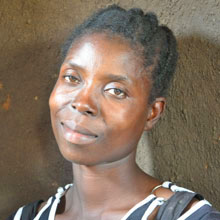
Christina Banda, Malawi
When 11-month-old Boniface started coughing and struggled to breathe, his mother, Christina Banda, took him straight to the village clinic. Realising the gravity of his condition, the health worker told her to go to the health centre immediately.
With her husband at the market, Christina had no choice but to set off on foot. “Four hours later, when we were close to the clinic, Boniface started to cry. I thought he was hungry so I took him off my back to try to feed him. Suddenly he stopped moving,” she recalls.
If Boniface had been vaccinated, he may have escaped his fatal attack of pneumonia altogether. But his fate also illustrates a problem facing many women in developing countries. While they tend to have the main responsibility for ensuring children’s health, they often lack the freedom, money and transportation that allow them to do it.
“Gender barriers” of the kind that stopped Christina from getting to the clinic on time are an important reason why children – both boys and girls – often go unimmunised.
Improving women’s status
While a 2010 study by WHO showed boys and girls are vaccinated at similar rates in most countries, it identified a range of different factors that inhibit women’s ability to access healthcare for their children. In addition to lack of decision-making power, money and transportation, gender barriers may include low levels of female education or illiteracy, limited privacy at the health clinic and burdensome household chores. In urban areas, in particular, clinic opening hours often clash with women’s working hours.
The WHO study showed that empowering women and improving their status in the family is critical to improving child vaccination coverage. The Gender Development Index, which measures the level of gender equality in different countries, provides further proof: a high score has a strong positive association with vaccine coverage.
It is important to encourage both men and women to take responsibility for children’s health. According to the study, making women the primary target of information campaigns merely perpetuates the idea that taking children to be vaccinated is a woman’s job – even if she doesn’t have the power or means to do so.
Common gender barriers to vaccination
![]() Lack of female education lowers awareness of the benefits of vaccination
Lack of female education lowers awareness of the benefits of vaccination
![]() Women cannot access family income to pay for transportation
Women cannot access family income to pay for transportation
![]() Lack of privacy at the health clinic
Lack of privacy at the health clinic
![]() Clinic opening times clash with working hours
Clinic opening times clash with working hours
![]() Women not allowed to leave the home without a male chaperone
Women not allowed to leave the home without a male chaperone
![]() No time to visit the health clinic because of household chores
No time to visit the health clinic because of household chores
![]() Information targets women only, even though it is often men who make decisions about the family
Information targets women only, even though it is often men who make decisions about the family
Breaking down the barriers
Female health workers have a critical role to play in addressing gender inequity in immunisation, especially in countries where women are not allowed to or are hesitant to speak to male health workers. Gavi support is helping countries ensure that female health workers are trained and available to provide immunisation services to women and children.

In Pakistan, community-based “lady health workers” have been trained with Gavi support to provide essential health services, especially in hard-to-reach rural areas. They educate families, particularly women, on topics such as pregnancy, nutrition, hygiene, family planning and immunisation.
Recently, Pakistan also started to train tens of thousands of lady health workers to administer vaccines. A comprehensive review of the lady health worker programme showed that households covered by lady health workers are 15% more likely to have immunised children than those in other areas.
“When the vaccinators announce their arrival every month, I go door-to-door to bring children who are due to get their shots,” says Rukhsana, who was recently trained as a lady health worker. “I make sure that all children in my villages are vaccinated.”
